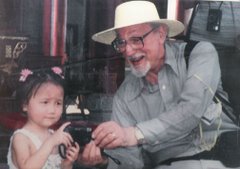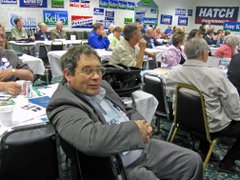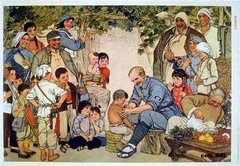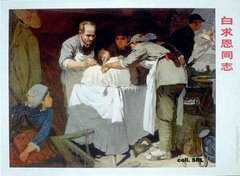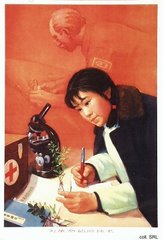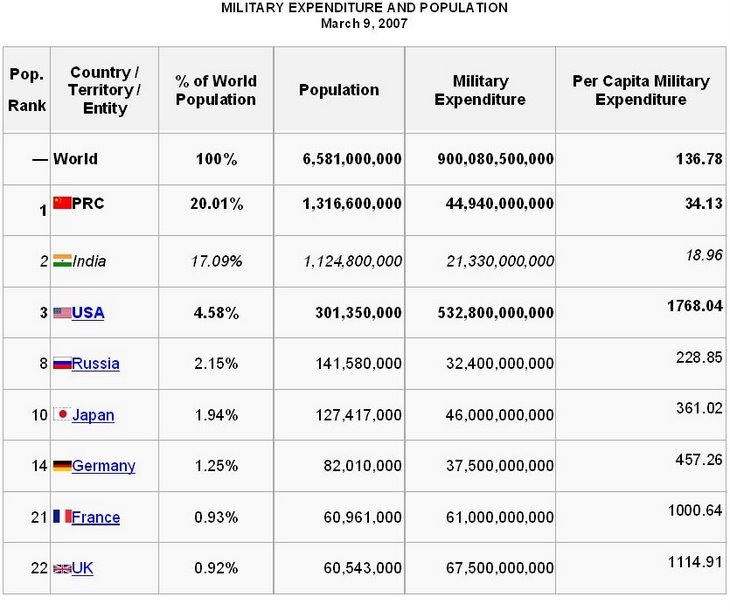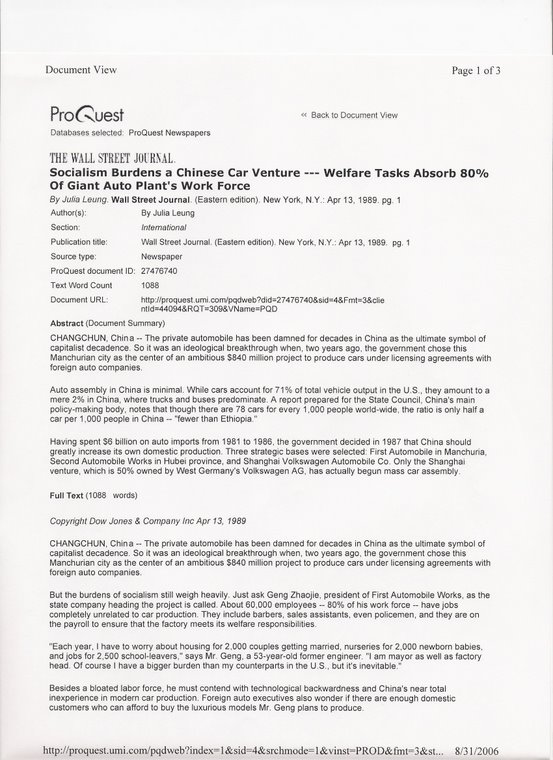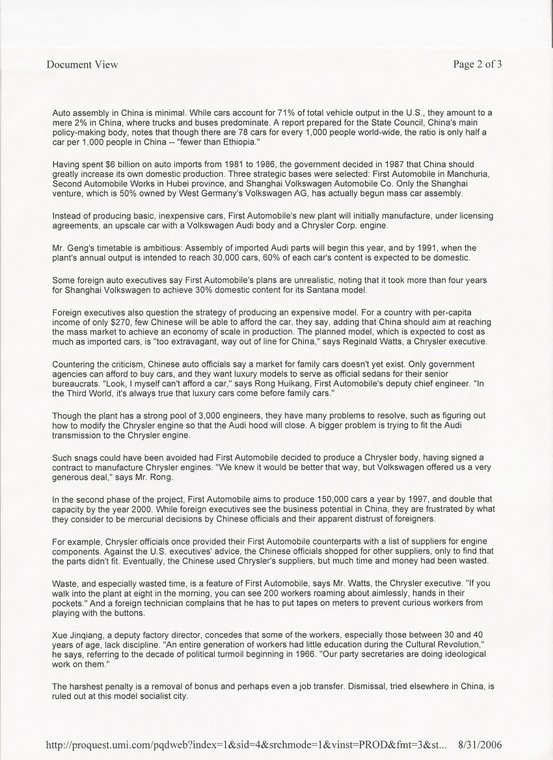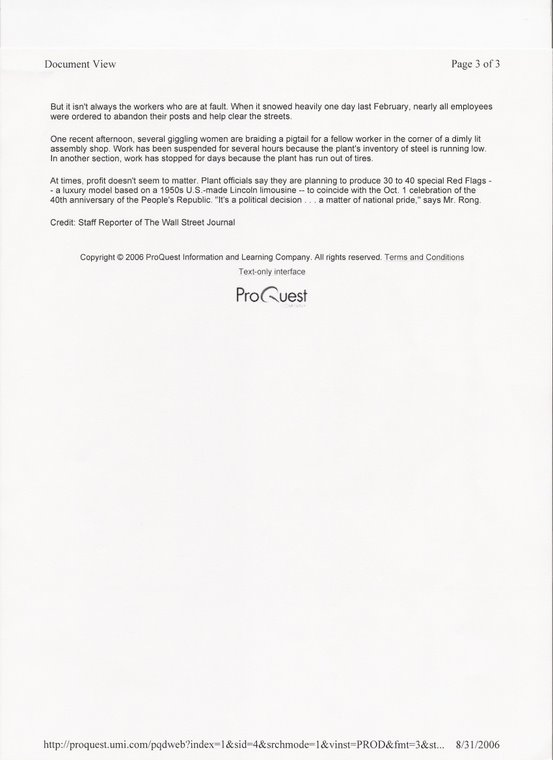Friday, March 2, 2007
The Emerging Hu-Wen-Zeng Troika
[Please note: Due to travel and inclement weather this blog was not posted according to schedule, therefore it will remain posted until Monday March 12. I am sorry about this problem... Alan Maki]
Dear Colleagues,
On January 16th we sent you comments on the Herald Tribune Article that we interpreted as a trial balloon to push Hu into the background of the PRC’s international relations and pull Zeng forward. We suspected, and still do, that this move was inspired by the anti-Hu centrist super modernization wing of the Communist Party, together with foreign influence to push China on a capitalist road and divert the Hu/Wen moves to rebalance the distribution of wealth and develop a Welfare State. We included information about Zeng’s position as the main advisor to Jiang Zemin who followed the ultra-modernization line.
We have now received a two-part article titled “The Emerging Hu-Wen-Zeng Troika,” which appeared in the Hong Kong Asia Times on February 21st. It appears that Hu, at this time, remains the super diplomat in control of the direction of the government of China. He, undoubtedly, will continue a deft but public crusade to clean out the corruption that has categorized decisive levels of the Communist Party and government officials, many of whom are or were Party leaders (we learned a year and a half ago that 78 billion dollars had been sent overseas by some 4,500 top cadre who fled the country and are still being sought). We are now aware of his breaking the Shanghai Gang, of which Zeng was an important advisor to the previous regime under Jiang.
Hu, as you will note, has turned over the role of organizing the cleanup of corruption in the Communist Party at this year’s 17th Congress in the Fall of this year. We have a very strong feeling about Hu’s genius as a diplomat and believe it possible that he could manage exemplary results from such a troika. Of course, Wen has always closely collaborated with Hu. Zeng, who is undoubtedly a highly competent leader and original thinker, might be groomed by them into a new direction and a strong bid for the future on a socialist road rather than a questionable capitalist direction.
Therefore, we hope that all the information you glean from the enclosed copy of Wu Zhong’s article by the China editor of Asia Times will give you considerable information to develop your own concept of the build up and results of the forthcoming congress whose main theme is the elimination of corruption and the forwarding of programs to build a harmonious society, rather than urging individuals to get rich quick.
Sincerely,
Sidney J. Gluck
-----------------------------------------------------------
Asia Times (HK)
2/21/07
SUN WUKONG
The emerging Hu-Wen-Zeng troika
By Wu Zhong, China Editor
HONG KONG - Chinese President Hu Jintao is in firm command of the preparations for the Communist Party's 17th Congress scheduled to be held in the autumn. This is a sure sign that Hu's authority as the supreme leader of the party and the country will be truly established in the upcoming five-yearly party congress and that he has walked out of the political shadow of predecessor Jiang Zemin.
Sources in Beijing confirm a report in the latest issue of The
Mirror, a Chinese-language pro-Beijing China-watching monthly based in Hong Kong, that two leading groups have been set up to take charge of the preparatory works for the party congress: one to oversee the draft of the keynote report to be delivered at the op ening that will set the party line for the next five years, the other to take care of personnel matters - including the selection of delegates and, more significant, the election of the new Central Committee.
With Hu's approval, Premier Wen Jiabao, now ranking No 2 in the party hierarchy, has been assigned to head the political-report-drafting group and Vice President Zeng Qinghong, now ranking No 5, to lead the personnel group. This indicates that a Hu-Wen-Zeng troika has been formed to lead the party's 17th National Congress and likely to be become the core of the party's leadership afterward, the sources say.
This debunks some earlier rumors, one of which had Jiang demanding that Wen step down if Hu wanted to force Jia Qingling, ranking No 4 in the Politburo's Standing Committee and also chairman of the Chinese People's Political Consultative Conference, and the ailing Vice Premier Huang Ju, ranking No 6, to retire at upcoming congress.
Both Jia and Huang are seen as Jiang's proteges. Another rumor said Hu was being urged to cede the presidency to Zeng, suggesting the two were locked in a power struggle ahead of the party meeting.
The keynote political report to a party congress is normally delivered by the party's leader. In the history of the Chinese Communist Party, there were a few exceptions in Mao Zedong's time when the Great Helmsman had his hand-picked successor read the report instead, though all of his designated successors proved to be politically short-lived.
So it is believed the political report will be delivered by Hu himself, though Wen is now overseeing its drafting. The Mirror report said Wen has already recruited elite party theorists and researchers from top think-tanks into the drafting group.
The report is expected to elaborate on Hu's idea of "building a socialist harmonious society" and "pursuing a harmonious world". Sources say that following party tradition, it is essential for Hu t o have his own ideas developed into the party's guiding ideology. Only in this way can his supreme leadership truly be established. From this viewpoint the drafting of the political report is a very important task. So to have Wen head the drafting group shows Hu believes the premier will faithfully accomplish the task.
And the approval of the political report (which is surely expected) means Hu's idea will be officially adopted as the party line. Some sources say the party constitution is also likely to be revised to include Hu's line as the party's theoretical guideline parallel with Deng Xiaoping's "thought" and Jiang's "three represents" theory.
Adoption of this line will formally mark the opening of the Hu era. "No doubt, the next five years will be strongly branded with the Hu stamp," said Li Ji, former vice president of the Chinese Academy of Social Sciences (CASS), in an interview with The Mirror.
In the division of labor in the current Politburo Stan ding Committee, Zeng's portfolio is to oversee the party's construction and organization affairs - a job Hu himself had concentrated on until he became party chief in late 2002. As such, Zeng is concurrently president of the Central Party School, the training center for senior cadres. And the party's Central Organization
Department, which handles the appointment and promotion of senior party and government officials, is directly under Zeng's supervision.
Given this portfolio, it is logical for Zeng to be assigned to head the preparatory group on personnel affairs. Nevertheless, it still shows that Zeng, who used to be regarded as a protege of Jiang and a key member of the so-called Shanghai clique, has won the trust and become an ally of Hu.
The reshuffle of personnel in the upcoming party meeting is so important to Hu that it would simply be unthinkable to have a rival in charge. Hu needs loyal cadres to implement his line. Or, as Mao put it: "Once the party line is established, c adres become the key factor" for implementation of the line.
Zeng's group has first to supervise the selection of 2,200 deputies from the 38 constituencies representing 72 million Communist Party members across the country. They include the 31 mainland provinces, the party's central units, the central government units, the People's Liberation Army, the paramilitary People's Armed Police, the state-owned enterprises, financial institutions under the central government, and the All-China Federation of Taiwan Compatriots (supposedly representing Taiwan).
According to the rules, 70% of the 2,200 deputies will be party and government officials. The 200-odd full members and 150-odd alternative members of the party's new Central Committee will be elected from among these 2,200 deputies during the congress. So another important task for Zeng's group is to work out a list of candidates for the new Central Committee.
Normally, all party chiefs and governors of the 31 mainland provinces are on the Central Committee. Thus all provinces are required to hold their local party congresses to pick new provincial party committees and party chiefs. This is to ensure that new blood will be injected into the new Central Committee. So far, 15 or so provinces, mostly in central and western China, have already convened their regional congresses. But economically important regions on the east coast such as Beijing, Shanghai, Tianjin and Guangdong have yet to hold their provincial-level congresses.
Analysts say Zeng will not be able to work out the list of candidates for the new Central Committee before the end of June when official reshuffles in all provinces are to be completed.
For this new round, Hu has instructed that strenuous efforts must be made to prevent the promotion of "ill" officials. In Chinese, the word "ill'' in the context of his speech has a double meaning. It refers not only to physical sickness but also to evil deeds such as corruption.
There are reasons for Hu to be concerned with the state of heath of those to be promoted. In the past, a couple of Politburo members died soon after they were elevated to the power center. The current example is Huang Ju, who is very ill, reportedly suffering from cancer of the pancreas since early last year. Hu's instruction signals that Huang definitely will have to say goodbye to his political career this autumn.
But Hu is surely more worried that corrupt officials might be promoted. In the past quite a number of corrupt officials were promoted to higher positions. Disgraced Shanghai party chief Chen Liangyu scorned the Central Commission for Disciplinary Inspection's warning that his secretary Qin Yu was suspected of involvement in a corruption scam, but insisted on promoting Qin to head a district in the city. Eventually, the CCDI's investigations of Qin led to the exposure of Chen himself. This has become a well-known example of "ill-promotion" am ong Chinese officials.
Sources say that an important condition in the selection of deputies to the party congress and of candidates for the new Central Committee is that they must be free of any suspicion of corruption. In this regard, the CCDI and regional party anti-graft watchdogs may play a role in the selections.
However, given the runaway protectionism at regional levels and nepotism in today's China, it will indeed be a backbreaking, if not impossible, mission for Zeng's group to be sure that all party cadres promoted ahead and during the party's 17th National Congress are clean.
Subject: A Disturbing Trial Balloon
Date: 1/16/2007 5:54:38 PM Eastern Standard Time
From: SJGluck
I would like to share a story from the International Herald Tribune. There appears to be a move to push Hu Jintao out of the Presidency of the State and give this position to Vice President Zeng Qinghong.
No doubt, there is a move to reduce the effectiveness of Hu Jintao, who is leading the country to a positive role in giving attention to poverty, the peasants and the conditions of workers, in other words, social security with equal emphasis to the question of economic growth. This has been the consistent move by Hu from the very beginning even in the first two years when he had considerable difficulty getting rid of Jiang Zemin's office holding and influence.
I will share with you an excerpt we have from a biography of Zeng Qinghong:
"As the Deputy Director of the General Office of the CPC Central Committee from 1989 to 1993, Zeng guided Jiang, an outsider to national politics, through the inner workings of the party, military and bureaucratic structure in Beijing. He promoted Jiang's leadership and thinking, broadened Jiang's network, and became Jiang's right-hand-man. Over the 1990s, Zeng consolidated control of party organs responsible for the appointment of cadres to important political positions. As head of the Organization Department of the CPC Central Committee from 1999-2002, he strengthened Jiang's position by promoting members of the president's "Shanghai clique" to leading central and regional posts. He also helped advanced Jiang's guiding political philosophy the Three Represents."
Clearly, the objective of this underground move is to bring back the influence of the influence of Jiang Zemin, which would concentrate strictly on the GDP without true concern for the masses.
Many of you know I have said that the establishment of a Socialist Welfare State under Chinese conditions would turn out to be an early stage on the road to socialism. Under Western conditions, the Welfare State and the New Deal were liberal defensives against the USSR in the 20th century. However, there have been incursions of various degrees in every country to reduce the benefits to the masses. Although it is also true that a Welfare State in China is a defensive, unless there is a reversal of the Hu Jintao trend towards development, there would be no incursions against it. This may be a hard pill for colleagues who believe in socialism, but I ask your consideration of the actual State of Affairs.
It is quite possible that Hu has won over Jiang because of his proven superb diplomatic abilities; but we cannot know this until we observe Jiang's performance as the appointed head to lead the preparation of the 7th Plenary in the Fall of 2007 which is intended to concentrate on eliminating corruption in the CCP at the expense of reducing its numbers, but cleaning out the opportunists. We should keep our eye on the progress of this trial balloon, pro and con. We might also tune in on any slight allusions on the part of Hu himself or Wen Jibao who is definitely of the same general line of opinion as Hu.
Sincerely,
Sidney
---------------------------------
Hu is urged to cede his position to the vice president
Reuters
Wednesday, January 10, 2007
BEIJING
The Chinese leader Hu Jintao has been urged to cede the presidency to a rival-turned-ally, sources said, a step that would sweep aside two decades of established practice and let him focus on extending Communist Party power.
Political allies of Vice President Zeng Qinghong have urged that he be promoted to state president at Parliament's annual session in 2008, the sources with close ties to the top leadership said, requesting anonymity to avoid repercussions for speaking to foreign media.
It was not certain whether the proposal would be adopted, but the debate is a sign that jockeying among leaders has begun in earnest before the 17th Communist Party Congress, due sometime between September and November of this year.
"There are voices in the party that it is no longer necessary for one person to hold all three positions," one source said, referring to the presidency and the top party and military jobs all currently held by Hu.
A second source said Zeng's supporters were arguing for a return to the modus vivendi of the late 1950s and early 1960s, when power was shared by four national leaders.
The practice continued under the paramount leader Deng Xiaoping in the early 1980s, with Hu Yaobang as party chief, Zhao Ziyang as prime minister and Li Xiannian as president. After Hu's political demise, Zhao took the top party post and Li Peng was prime minister.
In a departure from that practice, Jiang Zemin was given the presidency and the top party and military posts to bolster his relatively weak position as he rose to power after the 1989 Tiananmen Square crackdown.
Jiang ruled for 13 years until 2002, when he handed the party general secretary post to Hu, who replaced Jiang as president in 2003 and military chief the following year.
Hu, who reversed Jiang's emphasis on embracing the growing ranks of rich capitalists and has instead pursued policies over the past five years lifting up the rural poor, is expected to signal a fifth-generation heir and further consolidate power at the party congress.
While some analysts said that handing the presidency to Zeng could be perceived as a sign of weakness, other political sources said it could show Hu's confidence in his grip on power. He would still hold the more influential posts of party and military boss, and would have more time to focus on internal issues to strengthen the party's monopoly on power.
"Domestically, Hu will be seen as magnanimous if he lets Zeng become president," a third source said. "It'll be a recognition of Zeng's work."
"But it's a difficult decision because Hu needs the presidency to break out into the world," the source added.
Subject: The Disturbing “Trial Balloon” is Blowing Up
Date: 2/5/2007 6:09:21 PM Eastern Standard Time
From: SJGluck
Dear Colleagues,
Following our response to the Herald Tribune article sent to you on January 16th, which was the first public appearance of a program to create sentiment for Hu Jintao to give up the presidency of China in favor of Zeng Qinghong, the point man for Jiang Zemin who was succeeded by Hu after a good deal of pressure, there has been another leap forward in the publication of an extended story in the Asia News. We are attaching the communication just received from one of our associates who is not always gung ho about China. While this article repeats much of the original, it is much sharper about Hu’s resignation than the speculative tone of the Herald Tribune original. It is now quite obvious to the writer that a campaign is developing with great assistance from outside of China itself for the shifting of Hu’s responsibilities away from the international scene.
It is precisely his position as the Head of State of the government that allows him to exercise a most sophisticated ability for diplomacy that has become the benchmark of China’s foreign policy in the past few years following Hu’s ascension to leadership.
Further, the article in Asia News puts coloration on the relationship between Zeng and Hu which totally ignores the fact that it was Zeng who was the main advisor to Jiang Zemin for all of the critical aspects of government policies that ignored the Chinese people and maintained a touch of belligerency in its foreign policy over Taiwan. It further makes references to Deng Xiaoping (who was not a top leader of the Communist Party, only a highly respected advisor because he carried the label of modernization stamp on him by Chou En Lai), allowing for unfinished references to a three man leadership of China which was changed by Deng and Jiang Zemin, giving Jiang the full power for which the scepter has passed to Hu, not without a struggle.
The removal of Hu as the top spokesman for China on the world scene would be a set back for world developments and create an opportunity for elements within China to return to policies which were intolerable at best and suspect at worst.
Stay tuned and keep your eyes and ears open. The battle between private and social interests in China is sharpened under circumstances which at the moment still favor a road towards socialism through a Welfare State. We are witnessing the acceleration of a campaign to derail the social programs in China and China’s positive relations with countries around the world.
Sincerely,
Sidney J. Gluck
PS: An afterthought: If Zeng has changed at all in the present Political Bureau structure; it is because of Hu’s influence. Any change by Zeng is yet to be tried in the responsibilities that have been turned over to him in the fight against corruption that will take place very sharply in the forthcoming 7th Plenary later this year where Zeng has been put in charge of the program. I believe that this is a test rather than an approbation of Zeng’s actions since Hu’s ascendancy following Jiang’s final relinquishing of leadership of the People’s Liberation Army (PLA).
----------------------------------------------------------------------------------
AsiaNews - www.asianews.it
Last Updated: 01/17/2007 18:57
CHINA
Hu Jintao should cede the presidency to his former rival
Sources in the Communist leadership are saying that within the party there is one faction that is pushing for Zeng Qinghong, the last member of the Shanghai gang, to replaced Hu as president. The decision should come at the next annual meeting of the People's National Congress.
Beijing (AsiaNews) - Hu Jintao has been urged to cede the presidency to Vice-President Zeng Qinghong, a rival-turned-ally, and focus on extending Communist Party power as party general secretary, sources close to the top leadership said. Mr Hu, who is president, party leader and commander in chief of the armed forces, should make the change at next annual National People's Congress.
Although it is not clear whether the request will be heeded, the fact that it is raised is a sign that a debate is going on within the top leadership of the Communist regime
"There are voices in the party saying that it is no longer necessary for one person to hold all three positions," one source said.
A second source said that this would represent a return to the system under Mao Zedong, when the top political spots where filled by four different people. The practice continued under leader Deng Xiaoping in the early 1980s, but changed when Jiang Zemin came to power in 1989.
For some observers, Jiang was given top state, party and military posts to bolster his relatively weak position inside the communist leadership. After Jiang gradually relinquished power, Hu replaced him in all posts.
While some analysts believe giving up the presidency might be seen as a sign of weakness, others say it could show Mr Hu's confidence in his grip on power. However, it is a difficult decision since the president is the one who maintains relations with the world.
Having Mr Zeng take the presidency opens other possibilities. He is the last member of the Shanghai gang, Jiang Zemin's power base. From being rivals, he Zeng has become Hu's ally and has backed all his decisions. Sharing top positions seem more of a way of keeping power by preventing any fall out.
Even the decision to sack Chen Liangyu as Shanghai party boss for corruption seems to be a blip on the radar designed to strengthen the new alliance.
But for top leaders, the proposal by various intellectuals to differentiate government and party posts is seen as heretical. Several times they have said that the party's leading role cannot be questioned.
Dear Colleagues,
On January 16th we sent you comments on the Herald Tribune Article that we interpreted as a trial balloon to push Hu into the background of the PRC’s international relations and pull Zeng forward. We suspected, and still do, that this move was inspired by the anti-Hu centrist super modernization wing of the Communist Party, together with foreign influence to push China on a capitalist road and divert the Hu/Wen moves to rebalance the distribution of wealth and develop a Welfare State. We included information about Zeng’s position as the main advisor to Jiang Zemin who followed the ultra-modernization line.
We have now received a two-part article titled “The Emerging Hu-Wen-Zeng Troika,” which appeared in the Hong Kong Asia Times on February 21st. It appears that Hu, at this time, remains the super diplomat in control of the direction of the government of China. He, undoubtedly, will continue a deft but public crusade to clean out the corruption that has categorized decisive levels of the Communist Party and government officials, many of whom are or were Party leaders (we learned a year and a half ago that 78 billion dollars had been sent overseas by some 4,500 top cadre who fled the country and are still being sought). We are now aware of his breaking the Shanghai Gang, of which Zeng was an important advisor to the previous regime under Jiang.
Hu, as you will note, has turned over the role of organizing the cleanup of corruption in the Communist Party at this year’s 17th Congress in the Fall of this year. We have a very strong feeling about Hu’s genius as a diplomat and believe it possible that he could manage exemplary results from such a troika. Of course, Wen has always closely collaborated with Hu. Zeng, who is undoubtedly a highly competent leader and original thinker, might be groomed by them into a new direction and a strong bid for the future on a socialist road rather than a questionable capitalist direction.
Therefore, we hope that all the information you glean from the enclosed copy of Wu Zhong’s article by the China editor of Asia Times will give you considerable information to develop your own concept of the build up and results of the forthcoming congress whose main theme is the elimination of corruption and the forwarding of programs to build a harmonious society, rather than urging individuals to get rich quick.
Sincerely,
Sidney J. Gluck
-----------------------------------------------------------
Asia Times (HK)
2/21/07
SUN WUKONG
The emerging Hu-Wen-Zeng troika
By Wu Zhong, China Editor
HONG KONG - Chinese President Hu Jintao is in firm command of the preparations for the Communist Party's 17th Congress scheduled to be held in the autumn. This is a sure sign that Hu's authority as the supreme leader of the party and the country will be truly established in the upcoming five-yearly party congress and that he has walked out of the political shadow of predecessor Jiang Zemin.
Sources in Beijing confirm a report in the latest issue of The
Mirror, a Chinese-language pro-Beijing China-watching monthly based in Hong Kong, that two leading groups have been set up to take charge of the preparatory works for the party congress: one to oversee the draft of the keynote report to be delivered at the op ening that will set the party line for the next five years, the other to take care of personnel matters - including the selection of delegates and, more significant, the election of the new Central Committee.
With Hu's approval, Premier Wen Jiabao, now ranking No 2 in the party hierarchy, has been assigned to head the political-report-drafting group and Vice President Zeng Qinghong, now ranking No 5, to lead the personnel group. This indicates that a Hu-Wen-Zeng troika has been formed to lead the party's 17th National Congress and likely to be become the core of the party's leadership afterward, the sources say.
This debunks some earlier rumors, one of which had Jiang demanding that Wen step down if Hu wanted to force Jia Qingling, ranking No 4 in the Politburo's Standing Committee and also chairman of the Chinese People's Political Consultative Conference, and the ailing Vice Premier Huang Ju, ranking No 6, to retire at upcoming congress.
Both Jia and Huang are seen as Jiang's proteges. Another rumor said Hu was being urged to cede the presidency to Zeng, suggesting the two were locked in a power struggle ahead of the party meeting.
The keynote political report to a party congress is normally delivered by the party's leader. In the history of the Chinese Communist Party, there were a few exceptions in Mao Zedong's time when the Great Helmsman had his hand-picked successor read the report instead, though all of his designated successors proved to be politically short-lived.
So it is believed the political report will be delivered by Hu himself, though Wen is now overseeing its drafting. The Mirror report said Wen has already recruited elite party theorists and researchers from top think-tanks into the drafting group.
The report is expected to elaborate on Hu's idea of "building a socialist harmonious society" and "pursuing a harmonious world". Sources say that following party tradition, it is essential for Hu t o have his own ideas developed into the party's guiding ideology. Only in this way can his supreme leadership truly be established. From this viewpoint the drafting of the political report is a very important task. So to have Wen head the drafting group shows Hu believes the premier will faithfully accomplish the task.
And the approval of the political report (which is surely expected) means Hu's idea will be officially adopted as the party line. Some sources say the party constitution is also likely to be revised to include Hu's line as the party's theoretical guideline parallel with Deng Xiaoping's "thought" and Jiang's "three represents" theory.
Adoption of this line will formally mark the opening of the Hu era. "No doubt, the next five years will be strongly branded with the Hu stamp," said Li Ji, former vice president of the Chinese Academy of Social Sciences (CASS), in an interview with The Mirror.
In the division of labor in the current Politburo Stan ding Committee, Zeng's portfolio is to oversee the party's construction and organization affairs - a job Hu himself had concentrated on until he became party chief in late 2002. As such, Zeng is concurrently president of the Central Party School, the training center for senior cadres. And the party's Central Organization
Department, which handles the appointment and promotion of senior party and government officials, is directly under Zeng's supervision.
Given this portfolio, it is logical for Zeng to be assigned to head the preparatory group on personnel affairs. Nevertheless, it still shows that Zeng, who used to be regarded as a protege of Jiang and a key member of the so-called Shanghai clique, has won the trust and become an ally of Hu.
The reshuffle of personnel in the upcoming party meeting is so important to Hu that it would simply be unthinkable to have a rival in charge. Hu needs loyal cadres to implement his line. Or, as Mao put it: "Once the party line is established, c adres become the key factor" for implementation of the line.
Zeng's group has first to supervise the selection of 2,200 deputies from the 38 constituencies representing 72 million Communist Party members across the country. They include the 31 mainland provinces, the party's central units, the central government units, the People's Liberation Army, the paramilitary People's Armed Police, the state-owned enterprises, financial institutions under the central government, and the All-China Federation of Taiwan Compatriots (supposedly representing Taiwan).
According to the rules, 70% of the 2,200 deputies will be party and government officials. The 200-odd full members and 150-odd alternative members of the party's new Central Committee will be elected from among these 2,200 deputies during the congress. So another important task for Zeng's group is to work out a list of candidates for the new Central Committee.
Normally, all party chiefs and governors of the 31 mainland provinces are on the Central Committee. Thus all provinces are required to hold their local party congresses to pick new provincial party committees and party chiefs. This is to ensure that new blood will be injected into the new Central Committee. So far, 15 or so provinces, mostly in central and western China, have already convened their regional congresses. But economically important regions on the east coast such as Beijing, Shanghai, Tianjin and Guangdong have yet to hold their provincial-level congresses.
Analysts say Zeng will not be able to work out the list of candidates for the new Central Committee before the end of June when official reshuffles in all provinces are to be completed.
For this new round, Hu has instructed that strenuous efforts must be made to prevent the promotion of "ill" officials. In Chinese, the word "ill'' in the context of his speech has a double meaning. It refers not only to physical sickness but also to evil deeds such as corruption.
There are reasons for Hu to be concerned with the state of heath of those to be promoted. In the past, a couple of Politburo members died soon after they were elevated to the power center. The current example is Huang Ju, who is very ill, reportedly suffering from cancer of the pancreas since early last year. Hu's instruction signals that Huang definitely will have to say goodbye to his political career this autumn.
But Hu is surely more worried that corrupt officials might be promoted. In the past quite a number of corrupt officials were promoted to higher positions. Disgraced Shanghai party chief Chen Liangyu scorned the Central Commission for Disciplinary Inspection's warning that his secretary Qin Yu was suspected of involvement in a corruption scam, but insisted on promoting Qin to head a district in the city. Eventually, the CCDI's investigations of Qin led to the exposure of Chen himself. This has become a well-known example of "ill-promotion" am ong Chinese officials.
Sources say that an important condition in the selection of deputies to the party congress and of candidates for the new Central Committee is that they must be free of any suspicion of corruption. In this regard, the CCDI and regional party anti-graft watchdogs may play a role in the selections.
However, given the runaway protectionism at regional levels and nepotism in today's China, it will indeed be a backbreaking, if not impossible, mission for Zeng's group to be sure that all party cadres promoted ahead and during the party's 17th National Congress are clean.
Subject: A Disturbing Trial Balloon
Date: 1/16/2007 5:54:38 PM Eastern Standard Time
From: SJGluck
I would like to share a story from the International Herald Tribune. There appears to be a move to push Hu Jintao out of the Presidency of the State and give this position to Vice President Zeng Qinghong.
No doubt, there is a move to reduce the effectiveness of Hu Jintao, who is leading the country to a positive role in giving attention to poverty, the peasants and the conditions of workers, in other words, social security with equal emphasis to the question of economic growth. This has been the consistent move by Hu from the very beginning even in the first two years when he had considerable difficulty getting rid of Jiang Zemin's office holding and influence.
I will share with you an excerpt we have from a biography of Zeng Qinghong:
"As the Deputy Director of the General Office of the CPC Central Committee from 1989 to 1993, Zeng guided Jiang, an outsider to national politics, through the inner workings of the party, military and bureaucratic structure in Beijing. He promoted Jiang's leadership and thinking, broadened Jiang's network, and became Jiang's right-hand-man. Over the 1990s, Zeng consolidated control of party organs responsible for the appointment of cadres to important political positions. As head of the Organization Department of the CPC Central Committee from 1999-2002, he strengthened Jiang's position by promoting members of the president's "Shanghai clique" to leading central and regional posts. He also helped advanced Jiang's guiding political philosophy the Three Represents."
Clearly, the objective of this underground move is to bring back the influence of the influence of Jiang Zemin, which would concentrate strictly on the GDP without true concern for the masses.
Many of you know I have said that the establishment of a Socialist Welfare State under Chinese conditions would turn out to be an early stage on the road to socialism. Under Western conditions, the Welfare State and the New Deal were liberal defensives against the USSR in the 20th century. However, there have been incursions of various degrees in every country to reduce the benefits to the masses. Although it is also true that a Welfare State in China is a defensive, unless there is a reversal of the Hu Jintao trend towards development, there would be no incursions against it. This may be a hard pill for colleagues who believe in socialism, but I ask your consideration of the actual State of Affairs.
It is quite possible that Hu has won over Jiang because of his proven superb diplomatic abilities; but we cannot know this until we observe Jiang's performance as the appointed head to lead the preparation of the 7th Plenary in the Fall of 2007 which is intended to concentrate on eliminating corruption in the CCP at the expense of reducing its numbers, but cleaning out the opportunists. We should keep our eye on the progress of this trial balloon, pro and con. We might also tune in on any slight allusions on the part of Hu himself or Wen Jibao who is definitely of the same general line of opinion as Hu.
Sincerely,
Sidney
---------------------------------
Hu is urged to cede his position to the vice president
Reuters
Wednesday, January 10, 2007
BEIJING
The Chinese leader Hu Jintao has been urged to cede the presidency to a rival-turned-ally, sources said, a step that would sweep aside two decades of established practice and let him focus on extending Communist Party power.
Political allies of Vice President Zeng Qinghong have urged that he be promoted to state president at Parliament's annual session in 2008, the sources with close ties to the top leadership said, requesting anonymity to avoid repercussions for speaking to foreign media.
It was not certain whether the proposal would be adopted, but the debate is a sign that jockeying among leaders has begun in earnest before the 17th Communist Party Congress, due sometime between September and November of this year.
"There are voices in the party that it is no longer necessary for one person to hold all three positions," one source said, referring to the presidency and the top party and military jobs all currently held by Hu.
A second source said Zeng's supporters were arguing for a return to the modus vivendi of the late 1950s and early 1960s, when power was shared by four national leaders.
The practice continued under the paramount leader Deng Xiaoping in the early 1980s, with Hu Yaobang as party chief, Zhao Ziyang as prime minister and Li Xiannian as president. After Hu's political demise, Zhao took the top party post and Li Peng was prime minister.
In a departure from that practice, Jiang Zemin was given the presidency and the top party and military posts to bolster his relatively weak position as he rose to power after the 1989 Tiananmen Square crackdown.
Jiang ruled for 13 years until 2002, when he handed the party general secretary post to Hu, who replaced Jiang as president in 2003 and military chief the following year.
Hu, who reversed Jiang's emphasis on embracing the growing ranks of rich capitalists and has instead pursued policies over the past five years lifting up the rural poor, is expected to signal a fifth-generation heir and further consolidate power at the party congress.
While some analysts said that handing the presidency to Zeng could be perceived as a sign of weakness, other political sources said it could show Hu's confidence in his grip on power. He would still hold the more influential posts of party and military boss, and would have more time to focus on internal issues to strengthen the party's monopoly on power.
"Domestically, Hu will be seen as magnanimous if he lets Zeng become president," a third source said. "It'll be a recognition of Zeng's work."
"But it's a difficult decision because Hu needs the presidency to break out into the world," the source added.
Subject: The Disturbing “Trial Balloon” is Blowing Up
Date: 2/5/2007 6:09:21 PM Eastern Standard Time
From: SJGluck
Dear Colleagues,
Following our response to the Herald Tribune article sent to you on January 16th, which was the first public appearance of a program to create sentiment for Hu Jintao to give up the presidency of China in favor of Zeng Qinghong, the point man for Jiang Zemin who was succeeded by Hu after a good deal of pressure, there has been another leap forward in the publication of an extended story in the Asia News. We are attaching the communication just received from one of our associates who is not always gung ho about China. While this article repeats much of the original, it is much sharper about Hu’s resignation than the speculative tone of the Herald Tribune original. It is now quite obvious to the writer that a campaign is developing with great assistance from outside of China itself for the shifting of Hu’s responsibilities away from the international scene.
It is precisely his position as the Head of State of the government that allows him to exercise a most sophisticated ability for diplomacy that has become the benchmark of China’s foreign policy in the past few years following Hu’s ascension to leadership.
Further, the article in Asia News puts coloration on the relationship between Zeng and Hu which totally ignores the fact that it was Zeng who was the main advisor to Jiang Zemin for all of the critical aspects of government policies that ignored the Chinese people and maintained a touch of belligerency in its foreign policy over Taiwan. It further makes references to Deng Xiaoping (who was not a top leader of the Communist Party, only a highly respected advisor because he carried the label of modernization stamp on him by Chou En Lai), allowing for unfinished references to a three man leadership of China which was changed by Deng and Jiang Zemin, giving Jiang the full power for which the scepter has passed to Hu, not without a struggle.
The removal of Hu as the top spokesman for China on the world scene would be a set back for world developments and create an opportunity for elements within China to return to policies which were intolerable at best and suspect at worst.
Stay tuned and keep your eyes and ears open. The battle between private and social interests in China is sharpened under circumstances which at the moment still favor a road towards socialism through a Welfare State. We are witnessing the acceleration of a campaign to derail the social programs in China and China’s positive relations with countries around the world.
Sincerely,
Sidney J. Gluck
PS: An afterthought: If Zeng has changed at all in the present Political Bureau structure; it is because of Hu’s influence. Any change by Zeng is yet to be tried in the responsibilities that have been turned over to him in the fight against corruption that will take place very sharply in the forthcoming 7th Plenary later this year where Zeng has been put in charge of the program. I believe that this is a test rather than an approbation of Zeng’s actions since Hu’s ascendancy following Jiang’s final relinquishing of leadership of the People’s Liberation Army (PLA).
----------------------------------------------------------------------------------
AsiaNews - www.asianews.it
Last Updated: 01/17/2007 18:57
CHINA
Hu Jintao should cede the presidency to his former rival
Sources in the Communist leadership are saying that within the party there is one faction that is pushing for Zeng Qinghong, the last member of the Shanghai gang, to replaced Hu as president. The decision should come at the next annual meeting of the People's National Congress.
Beijing (AsiaNews) - Hu Jintao has been urged to cede the presidency to Vice-President Zeng Qinghong, a rival-turned-ally, and focus on extending Communist Party power as party general secretary, sources close to the top leadership said. Mr Hu, who is president, party leader and commander in chief of the armed forces, should make the change at next annual National People's Congress.
Although it is not clear whether the request will be heeded, the fact that it is raised is a sign that a debate is going on within the top leadership of the Communist regime
"There are voices in the party saying that it is no longer necessary for one person to hold all three positions," one source said.
A second source said that this would represent a return to the system under Mao Zedong, when the top political spots where filled by four different people. The practice continued under leader Deng Xiaoping in the early 1980s, but changed when Jiang Zemin came to power in 1989.
For some observers, Jiang was given top state, party and military posts to bolster his relatively weak position inside the communist leadership. After Jiang gradually relinquished power, Hu replaced him in all posts.
While some analysts believe giving up the presidency might be seen as a sign of weakness, others say it could show Mr Hu's confidence in his grip on power. However, it is a difficult decision since the president is the one who maintains relations with the world.
Having Mr Zeng take the presidency opens other possibilities. He is the last member of the Shanghai gang, Jiang Zemin's power base. From being rivals, he Zeng has become Hu's ally and has backed all his decisions. Sharing top positions seem more of a way of keeping power by preventing any fall out.
Even the decision to sack Chen Liangyu as Shanghai party boss for corruption seems to be a blip on the radar designed to strengthen the new alliance.
But for top leaders, the proposal by various intellectuals to differentiate government and party posts is seen as heretical. Several times they have said that the party's leading role cannot be questioned.
Subscribe to:
Comments (Atom)

